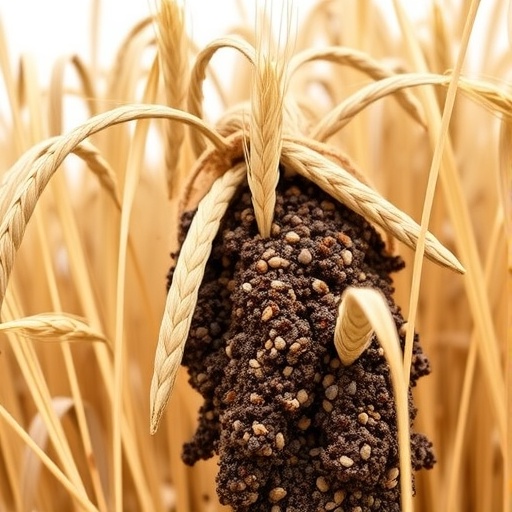In a groundbreaking study, researchers have delved into the use of native stilbite zeolite combined with vermicompost, a powerful combination designed to enhance soil chemical properties and improve barley yield. This innovative approach is particularly significant given the agricultural challenges faced in arid regions like Northern Ethiopia, where soil fertility and crop productivity are often compromised. The findings could have profound implications for food security and sustainable agricultural practices in drylands.
Stilbite zeolite, a naturally occurring mineral, has shown promise in boosting soil quality due to its unique properties. It acts as a molecular sieve, capable of retaining nutrients and moisture, which are critical for plant growth. When coupled with vermicompost, which is rich in organic matter and beneficial microorganisms, the advantages multiply. Vermicompost not only improves soil structure but also enhances the nutrient-holding capacity of the soil, making it an essential component in sustainable farming practices.
The study specifically investigated the impacts of this zeolite and vermicompost synergy on barley, scientifically known as Hordeum vulgare L. Barley is a staple crop in many arid and semi-arid regions and serves as a vital food source. The authors aimed to ascertain whether the application of this dual approach would yield higher barley production compared to traditional farming methods in the Aridic Calciusterts of Northern Ethiopia, a soil type known for its limited fertility.
The methodology deployed in the study was rigorous and multifaceted. Researchers established field trials that involved various treatment groups, including control plots and those enriched with differing ratios of zeolite and vermicompost. This experimental design allowed for a comprehensive analysis of how each treatment influenced the soil’s chemical properties, moisture retention, and ultimately, the crop yield. Precise measurements of soil pH, electrical conductivity, and nutrient availability were taken at different growth stages of the barley plants, providing a robust dataset for analysis.
The results revealed a significant enhancement in several soil chemical properties in plots treated with both stilbite zeolite and vermicompost. Notably, improvements in soil pH and nutrient availability were observed, alongside an increase in microbial activity. These changes are crucial for plant health and growth, as they promote a more favorable environment for root development and nutrient uptake. The synergistic effect of incorporating zeolite with organic matter transformed the soil into a more productive medium.
As barley plants emerged, the positive impact of the treatments became even more evident. Enhanced growth characteristics and yield metrics were recorded in the treated plots compared to the controls. The study highlighted that barley grown in soils treated with the combination of stilbite zeolite and vermicompost produced higher biomass, better root development, and increased grain yields. This finding signifies that small-scale farmers in arid regions could adopt this innovative practice to achieve food security and improve livelihoods.
Furthermore, the economic implications of this research cannot be overstated. With rising global food demands and the increasing frequency of droughts attributed to climate change, sustainable practices that boost crop yields while maintaining environmental health are essential. Farmers who implement the zolite and vermicompost treatment could potentially see a significant return on investment, making agriculture more resilient and profitable in arid climates.
Another compelling aspect of the study was its emphasis on sustainability. Traditional agricultural practices, which often rely heavily on chemical fertilizers, can lead to long-term soil degradation, water pollution, and a decrease in biodiversity. In contrast, the use of native zeolite and vermicompost not only improves soil health but also promotes a more ecological approach to farming. It serves as a sustainable alternative, reducing reliance on synthetic inputs and fostering a more harmonious relationship between agriculture and the ecosystem.
The research team also acknowledged the potential for this method to be adapted and scaled in various geographical contexts. Regions with similar soil profiles and climatic challenges could benefit from implementing this zeolite-vermicompost approach, creating a ripple effect in global sustainable agricultural practices. The adaptability of this method makes it an inspiring case study for researchers and agriculturalists alike.
Moreover, the study encourages further exploration of indigenous materials and their beneficial properties in agriculture. By tapping into local resources, farmers can bolster productivity while minimizing the carbon footprint associated with transporting synthetic fertilizers and amendments. This shift towards utilizing local geologic resources showcases the ingenuity and resilience of traditional farming practices.
As this research gains visibility, it is likely to resonate with a broader audience concerned with sustainable farming and environmental sustainability. The narrative of combining ancient agricultural wisdom with modern scientific methods can inspire a generation of farmers and policymakers to prioritize sustainable agricultural development. The challenge of feeding a burgeoning global population amid climatic changes requires innovative solutions, and this study illuminates one promising pathway forward.
In conclusion, the integration of native stilbite zeolite and vermicompost presents not just a technical advancement but a cultural shift toward sustainable agricultural practices in arid regions. As researchers continue to unveil the benefits of this approach, the broader agricultural community is urged to consider local solutions that harness the power of natural resources. Through continued innovation and commitment to sustainable practices, we can pave the way for a more resilient and secure food future.
Subject of Research: Use of native stilbite zeolite and vermicompost for soil improvement and barley yield enhancement in arid climates.
Article Title: Use of native stilbite zeolite coupled with vermicompost for improving soil chemical properties and yield of barley (Hordeum vulgare L.) grown on Aridic Calciusterts of Northern Ethiopia.
Article References:
Retta, A.N., Haile, M., Gebresamuel, G. et al. Use of native stilbite zeolite coupled with vermicompost for improving soil chemical properties and yield of barley (Hordeum vulgare L.) grown on Aridic Calciusterts of Northern Ethiopia. Discov Sustain 6, 910 (2025). https://doi.org/10.1007/s43621-025-01487-0
Image Credits: AI Generated
DOI: 10.1007/s43621-025-01487-0
Keywords: Stilbite Zeolite, Vermicompost, Barley Yield, Soil Health, Sustainable Agriculture, Arid Climate, Food Security.




